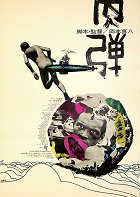Regie:
Kihachi OkamotoKamera:
Hiroshi MuraiMusik:
Masaru SatōBesetzung:
Yoshitaka Zushi, Masumi Harukawa, 菅井きん, Chishû Ryû, Tatsuya Nakadai, Shôichi Ozawa, 寺田農, 田中邦衛, 富永美沙子, 北林谷栄, Etsushi Takahashi, Naoko Ôtani, Hideyo Amamoto (mehr)Inhalte(1)
Gegen Ende des zweiten Weltkrieges werden einige japanische Soldaten dazu abkommandiert, dass Festland als menschliche Torpedos gegen US-amerikanische Kriesgschiffe zu verteidigen. Kihachi Okamotos mit galligem Humor durchsetzter Anti-Kriegsfilm Human Bullet zeichnet ein solches Schicksal nach. (Verleiher-Text)
Kritiken (1)
The head, which transforms into a skull, is already empty beforehand. Madness says: death is already here.* War says: madness comes with me. Madness anticipates while the soldier's head remembers - from this aporia arises the second deadly effect of war: it never ends. For the survivor, for the "witness," it forever returns with their memory - film as retrospection, telling the story of one soldier's past and as a medium of collective repressed memory (repressed because The Human Bullet unmasks, back then the times had not yet ended when film could have a social function other than economic-operational); but also film as an image of anticipation - war as a bridge between the past and the future because the absurdity of the world connected by the bridge of memory has not disappeared. The hero's war began at the moment when the war had already ended: how can one not judge from this that war never ends? Just like in "Catch-22," it brilliantly touches one's emotions to see how the hero is caught in the trap of the absurdity of time, from which there is no escape either forward or backward because his fate was always sealed in the logic of war. *) "History of Madness," 1961.
()
